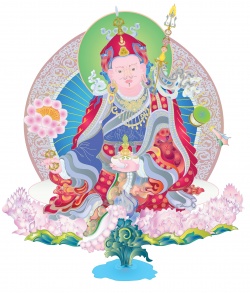Difference between revisions of "The Ts'an T'ung Ch'i' A Buddhist Poem by Shih T'ou (700-790) by Peter Morrell"
| Line 1: | Line 1: | ||
| − | {{DisplayImages|347|394|2739 | + | {{DisplayImages|347|394|2739}} |
{{Centre|<big><big>The Ts'an T'ung Ch'i'<br/> | {{Centre|<big><big>The Ts'an T'ung Ch'i'<br/> | ||
A Buddhist Poem by Shih T'ou [700-790]<br/> </big></big> | A Buddhist Poem by Shih T'ou [700-790]<br/> </big></big> | ||
by [[Peter Morrell]]}}<br/><br/> | by [[Peter Morrell]]}}<br/><br/> | ||
| − | 1. The genius of mind of the Great Sage of India [Buddha] came East [to China] from the West [India] in secret. | + | 1. The genius of [[mind]] of the Great [[Sage]] of [[India]] [[[Buddha]]] came [[East]] [to [[China]]] from the [[West]] [[[India]]] in secret. |
| − | 2. Man fundamentally is both clever and stupid but in the Way there is no Northern or Southern teacher. | + | 2. Man fundamentally is both clever and stupid but in the Way there is no Northern or Southern [[teacher]]. |
| − | 3. The Mysterious Source [Buddha Nature] is bright, clear and pure but the branching streams flow on in darkness invisible to the mind's eye. | + | 3. The Mysterious Source [[[Buddha Nature]]] is bright, clear and [[pure]] but the branching streams flow on in {{Wiki|darkness}} {{Wiki|invisible}} to the [[mind's eye]]. |
| − | 4. Clinging to transient phenomena is the primary illusion, yet even to be bound to Buddhist principles is not Enlightenment. | + | 4. [[Clinging]] to transient [[phenomena]] is the primary [[illusion]], yet even to be [[bound]] to [[Buddhist principles]] is not [[Enlightenment]]. |
| − | 5. The Outer [Objective] and Inner [Subjective] components of the universe are inter-related and yet independent of one another. | + | 5. The Outer [[[Objective]]] and Inner [Subjective] components of the [[universe]] are inter-related and yet {{Wiki|independent}} of one another. |
| − | 6. They relate and work together despite their differences in function and position. | + | 6. They relate and work together despite their differences in [[function]] and position. |
| − | 7. The outer form of things blinds us to their true nature, just as sounds may cause joy or sorrow in different people. | + | 7. The [[outer form]] of things blinds us to their [[true nature]], just as {{Wiki|sounds}} may [[cause]] [[joy]] or [[sorrow]] in different [[people]]. |
| − | 8. But the Dark [true nature] unites all teachings, and the Light [true nature] distinguishes clear and obscure scriptures. | + | 8. But the Dark [[[true nature]]] unites all teachings, and the Light [[[true nature]]] distinguishes clear and obscure [[scriptures]]. |
| − | 9. The Four Elements return to their Source like a child reaching its mother | + | 9. The [[Four Elements]] return to their Source like a child reaching its mother |
| − | 10. Fire is hot, wind moves to and fro, water is wet and the earth is firm and strong. | + | 10. [[Fire]] is [[hot]], [[wind]] moves to and fro, [[water]] is wet and the [[earth]] is firm and strong. |
| − | 11. The eyes see colours and the ears hear sounds, the nose smells scents and the tongue tastes salty or sour. | + | 11. The [[eyes]] see colours and the [[ears]] hear {{Wiki|sounds}}, the {{Wiki|nose}} {{Wiki|smells}} {{Wiki|scents}} and the {{Wiki|tongue}} {{Wiki|tastes}} [[salty]] or [[sour]]. |
| − | 12. Yet in all this diversity of form [outer] there is unity of essence [inner] just as many leaves spread from the same root. | + | 12. Yet in all this diversity of [[form]] [outer] there is {{Wiki|unity}} of [[essence]] [inner] just as many leaves spread from the same [[root]]. |
| − | 13. Root and branch [cause and effect] must derive from the permanent reality. Though we say honourable and humble they are just words with no meanings. | + | 13. [[Root]] and branch [[[cause and effect]]] must derive from the [[permanent]] [[reality]]. Though we say honourable and [[humble]] they are just words with no meanings. |
| − | 14. At its heart the light [outer] is dark [inner], but do not seek this darkness. | + | 14. At its [[heart]] the {{Wiki|light}} [outer] is dark [inner], but do not seek this {{Wiki|darkness}}. |
| − | 15. At its heart the dark [inner] is light [outer], but do not seek this light. | + | 15. At its [[heart]] the dark [inner] is {{Wiki|light}} [outer], but do not seek this {{Wiki|light}}. |
| − | 16. The light [outer] and the dark [inner] form a pair, like one foot ahead and one behind when walking. | + | 16. The {{Wiki|light}} [outer] and the dark [inner] [[form]] a pair, like one foot ahead and one behind when walking. |
| − | 17. The myriad things [of the universe] have their own intrinsic values and keep their own functions and positions. | + | 17. The {{Wiki|myriad}} things [of the [[universe]]] have their own intrinsic values and keep their own functions and positions. |
| − | 18. Transient phenomena and the permanent fit together like a box and its lid; the Absolute and the Relative operate like two arrows meeting point-to-point in mid-air. | + | 18. Transient [[phenomena]] and the [[permanent]] fit together like a box and its lid; the [[Absolute]] and the [[Relative]] operate like two arrows meeting point-to-point in mid-air. |
| − | 19. Reading these words you must have reached the permanent, so do not set up rules and standards to judge life. | + | 19. Reading these words you must have reached the [[permanent]], so do not set up rules and standards to judge [[life]]. |
| − | 20. Though you do not see the Way, you are already on it. Going by foot or horse [ordinary life] you can know the Way. | + | 20. Though you do not see the Way, you are already on it. Going by foot or [[horse]] [ordinary [[life]]] you can know the Way. |
| − | 21. When you walk on the Way it is neither near nor far, but if you are deluded in heart then you are certainly mountains and rivers away from it. | + | 21. When you walk on the Way it is neither near nor far, but if you are deluded in [[heart]] then you are certainly [[mountains]] and [[rivers]] away from it. |
| − | 22. With respect I say to you, reflect [meditate] on purity and seek a true Master; if you want to attain Enlightenment, then do not waste your time in vain. | + | 22. With [[respect]] I say to you, reflect [[[meditate]]] on [[purity]] and seek a true [[Master]]; if you want to attain [[Enlightenment]], then do not waste your [[time]] in vain. |
| − | '''Note:''' Traditionally Chinese was always written downwards vertically in rows starting on the right and progressing leftwards. | + | '''Note:''' [[Traditionally]] {{Wiki|Chinese}} was always written downwards vertically in rows starting on the right and progressing leftwards. |
[[File:3callig0000000.jpg|frameless|centre|550px|]] | [[File:3callig0000000.jpg|frameless|centre|550px|]] | ||
Revision as of 18:29, 13 July 2014
The Ts'an T'ung Ch'i'
A Buddhist Poem by Shih T'ou [700-790]
by Peter Morrell
1. The genius of mind of the Great Sage of India [[[Buddha]]] came East [to China] from the West [[[India]]] in secret.
2. Man fundamentally is both clever and stupid but in the Way there is no Northern or Southern teacher.
3. The Mysterious Source [[[Buddha Nature]]] is bright, clear and pure but the branching streams flow on in darkness invisible to the mind's eye.
4. Clinging to transient phenomena is the primary illusion, yet even to be bound to Buddhist principles is not Enlightenment.
5. The Outer [[[Objective]]] and Inner [Subjective] components of the universe are inter-related and yet independent of one another.
6. They relate and work together despite their differences in function and position.
7. The outer form of things blinds us to their true nature, just as sounds may cause joy or sorrow in different people.
8. But the Dark [[[true nature]]] unites all teachings, and the Light [[[true nature]]] distinguishes clear and obscure scriptures.
9. The Four Elements return to their Source like a child reaching its mother
10. Fire is hot, wind moves to and fro, water is wet and the earth is firm and strong.
11. The eyes see colours and the ears hear sounds, the nose smells scents and the tongue tastes salty or sour.
12. Yet in all this diversity of form [outer] there is unity of essence [inner] just as many leaves spread from the same root.
13. Root and branch [[[cause and effect]]] must derive from the permanent reality. Though we say honourable and humble they are just words with no meanings.
14. At its heart the light [outer] is dark [inner], but do not seek this darkness.
15. At its heart the dark [inner] is light [outer], but do not seek this light.
16. The light [outer] and the dark [inner] form a pair, like one foot ahead and one behind when walking.
17. The myriad things [of the universe] have their own intrinsic values and keep their own functions and positions.
18. Transient phenomena and the permanent fit together like a box and its lid; the Absolute and the Relative operate like two arrows meeting point-to-point in mid-air.
19. Reading these words you must have reached the permanent, so do not set up rules and standards to judge life.
20. Though you do not see the Way, you are already on it. Going by foot or horse [ordinary life] you can know the Way.
21. When you walk on the Way it is neither near nor far, but if you are deluded in heart then you are certainly mountains and rivers away from it.
22. With respect I say to you, reflect [[[meditate]]] on purity and seek a true Master; if you want to attain Enlightenment, then do not waste your time in vain.
Note: Traditionally Chinese was always written downwards vertically in rows starting on the right and progressing leftwards.



